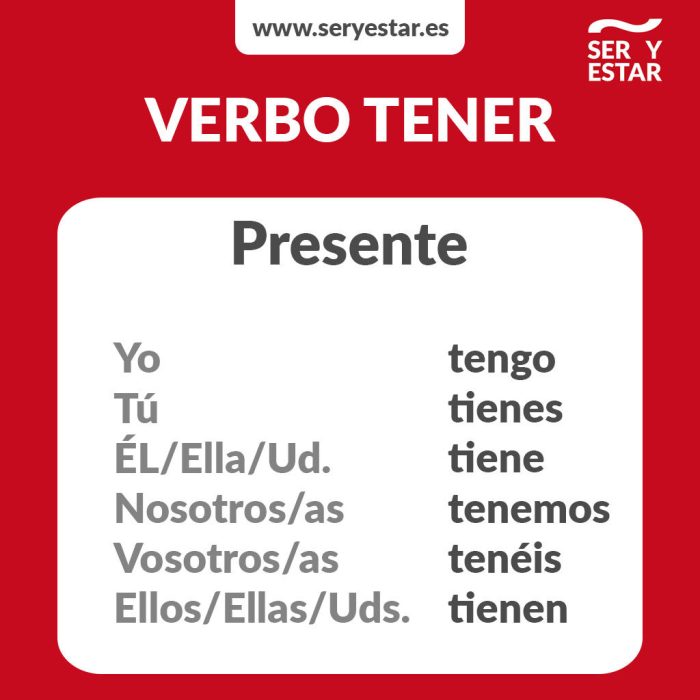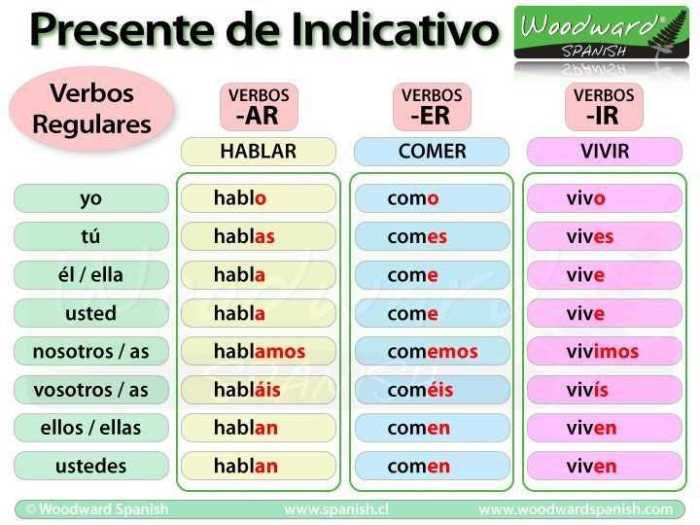Unveiling the mysteries of Spanish grammar, the gramatica a the verb tener answer key provides a comprehensive guide to mastering the versatile verb “tener.” Join us on an enlightening journey as we explore its grammatical nuances, common phrases, and advanced applications, unlocking the secrets of effective Spanish communication.
Through this in-depth exploration, we will unravel the intricacies of “tener,” empowering you to confidently navigate Spanish conversations and written texts, expressing yourself with precision and eloquence.
Grammatical Concepts Related to “Tener”
Grammatical Function of “Tener”
Tener, meaning “to have” in English, is a highly versatile verb in Spanish grammar. It serves as an auxiliary verb in certain constructions, such as the perfect tenses, and also functions independently as a main verb.
Conjugations of “Tener”
Tener undergoes various conjugations based on the tense and subject of the sentence. The following table Artikels the conjugations for different tenses:
| Tense | Subject | Conjugation |
|---|---|---|
| Present | yo | tengo |
| Present | tú | tienes |
| Present | él/ella/usted | tiene |
| Preterite | yo | tuve |
| Preterite | tú | tuviste |
| Preterite | él/ella/usted | tuvo |
| Imperfect | yo | tenía |
| Imperfect | tú | tenías |
| Imperfect | él/ella/usted | tenía |
Examples of “Tener” Usage
Tener is commonly used in various grammatical structures. Here are a few examples:
- As a main verb: Tengo un libro.(I have a book.)
- As an auxiliary verb: He tenido una gran idea.(I have had a great idea.)
- In idiomatic expressions: Tener suerte.(To be lucky.)
Usage of “Tener” in Common Phrases

The verb “tener” is widely used in Spanish to express various meanings beyond simple possession. It plays a crucial role in forming common phrases and expressions that convey different nuances and ideas.
These phrases often serve as idiomatic expressions, carrying specific meanings that may not be directly deducible from the individual words. Understanding their usage is essential for effective communication in Spanish.
Tener hambre/sed
The phrase “tener hambre” literally means “to have hunger” and is used to express the feeling of being hungry. Similarly, “tener sed” means “to have thirst” and indicates a desire for a drink.
Examples:
- Tengo mucha hambre. (I am very hungry.)
- Tengo mucha sed. (I am very thirsty.)
Tener frío/calor
The phrase “tener frío” means “to have cold” and is used to express the feeling of being cold. Conversely, “tener calor” means “to have heat” and indicates a feeling of being hot.
Examples:
- Tengo mucho frío. (I am very cold.)
- Tengo mucho calor. (I am very hot.)
Tener sueño
The phrase “tener sueño” literally means “to have sleep” and is used to express the feeling of being sleepy or tired.
Example:
- Tengo mucho sueño. (I am very sleepy.)
Tener miedo
The phrase “tener miedo” means “to have fear” and is used to express the feeling of being afraid or scared.
Example:
- Tengo miedo de las arañas. (I am afraid of spiders.)
Tener razón/incorrecto
The phrase “tener razón” means “to have reason” and is used to indicate that someone is correct or right. Conversely, “tener incorrecto” means “to have incorrect” and indicates that someone is wrong.
Examples:
- Tienes razón. (You are right.)
- Estás incorrecto. (You are wrong.)
Differences between “Tener” and Other Similar Verbs: Gramatica A The Verb Tener Answer Key
The verb “tener” has several synonyms in Spanish, including “poseer” and “contar con”. While these verbs share some similarities in meaning, there are also subtle differences in their usage and connotations.
“Tener” vs. “Poseer”
“Tener” and “poseer” both mean “to have” or “to possess” something. However, “tener” is more commonly used in everyday speech, while “poseer” is more formal and literary. Additionally, “poseer” often implies a sense of ownership or legal possession, while “tener” can simply refer to having something in one’s possession.
- Example: “Tengo un libro.” (I have a book.)
- Example: “Poseo una colección de sellos.” (I own a stamp collection.)
“Tener” vs. “Contar con”
“Tener” and “contar con” both mean “to have” or “to possess” something, but “contar con” also implies a sense of reliance or dependence on that thing. In other words, “contar con” suggests that something is essential or necessary for a particular purpose.
- Example: “Tengo un coche.” (I have a car.)
- Example: “Cuento con un equipo de expertos.” (I have a team of experts at my disposal.)
Advanced Applications of “Tener”

The verb “tener” possesses versatile applications beyond its fundamental usage. It assumes multifaceted roles in complex grammatical structures, expressing possession, obligation, and necessity. This section explores these advanced applications, elucidating their significance in Spanish literature and conversation.
Expressing Possession, Gramatica a the verb tener answer key
“Tener” functions as a possessive verb, indicating ownership or possession. It agrees with the possessed object in number and person, as exemplified below:
- Tengo un libro. (I have a book.)
- Tenemos muchos amigos. (We have many friends.)
Expressing Obligation
When combined with “que” and the infinitive of another verb, “tener” conveys obligation or necessity. This construction often translates to “have to” or “must” in English:
Tengo que estudiar para el examen. (I have to study for the exam.)
Expressing Necessity
“Tener” can also express necessity, indicating an essential or indispensable need. This usage often employs the phrase “tener que” followed by the infinitive of another verb:
- Necesitamos tener un plan. (We need to have a plan.)
- Tienes que ser paciente. (You need to be patient.)
Examples in Literature and Conversation
In Spanish literature, “tener” appears extensively in various contexts, reflecting its versatility. For instance, in Miguel de Cervantes’ “Don Quixote,” the protagonist frequently expresses his obligations and necessities using “tener que”:
“Tengo que defender a los débiles.” (I have to defend the weak.)
In everyday conversation, “tener” plays a crucial role in conveying possession, obligation, and necessity. It allows speakers to express a wide range of ideas and emotions effectively.
Common Queries
What is the primary function of the verb “tener”?
Tener serves as a versatile verb in Spanish, primarily used to express possession, obligation, or necessity.
How does the conjugation of “tener” vary across different tenses?
The conjugation of “tener” varies depending on the tense, person, and number, following specific grammatical rules for each tense.
What are some common phrases that utilize the verb “tener”?
Numerous common phrases in Spanish incorporate “tener,” such as “tener hambre” (to be hungry), “tener razón” (to be right), and “tener cuidado” (to be careful).